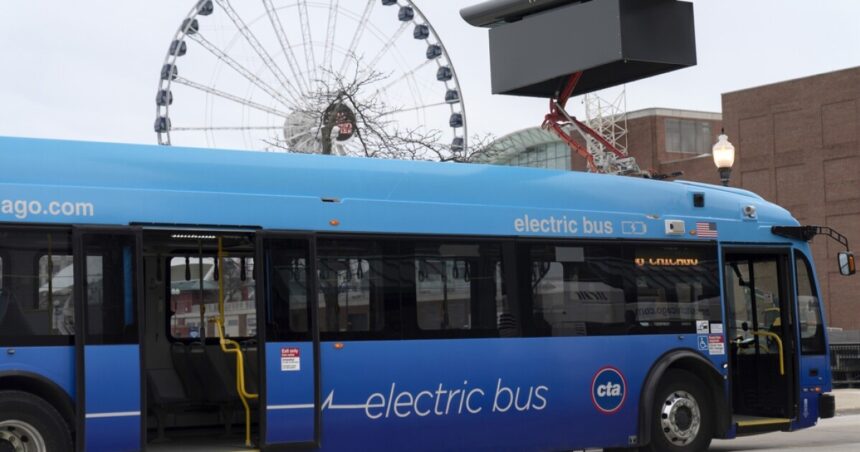The Biden administration is allocating close to $2 billion in grants to support the expansion or restart of electric vehicle manufacturing and assembly sites in eight states, including key battleground states like Michigan, Pennsylvania, and Georgia.
The Energy Department is set to distribute grants totaling $1.7 billion to create and preserve numerous union jobs while bolstering communities with strong ties to the automotive industry, a pillar of the U.S. economy, as announced by the White House on Thursday. In addition to the three aforementioned battleground states, grants will also be channeled towards EV facilities in Ohio, Illinois, Indiana, Maryland, and Virginia.
The grants encompass a wide array of the automobile supply chain, encompassing components for electric motorcycles and school buses, hybrid powertrains, heavy-duty commercial truck batteries, and electric SUVs, as highlighted by the White House.
“Developing a clean energy economy can and should be beneficial for both union autoworkers and automakers,” stated President Joe Biden. “This investment will generate thousands of well-paying, union manufacturing jobs and safeguard even more – from Lansing, Michigan to Fort Valley, Georgia – by empowering auto companies to modernize, revive, and rehire within the same factories and communities.”
The grants, financed by the groundbreaking 2022 climate law, are designed to fulfill his pledge to ensure that the future of the automotive industry is crafted in America by American union workers, Biden affirmed.
“Workers who were neglected by my predecessor are now experiencing a resurgence with the backing of my policies, including the conversion grants outlined by my administration today,” the Democratic president emphasized.
RELATED STORY| Two-thirds of all cars sold in US must be electric by 2032
The grant announcement comes amidst Biden refusing to step aside following a disastrous debate performance last month. Biden, aged 81, has admitted to his lackluster showing but attributes it to a “bad night,” even as various congressional Democrats, including former House Speaker Nancy Pelosi, decline to offer him unreserved support.
On the other hand, former President Donald Trump continues to exert a firm grip on the Republican party, despite being the first former president to be convicted of a felony.
“Few things are more detrimental to a manufacturing community than losing jobs to foreign competition and a shifting industry,” remarked Energy Secretary Jennifer Granholm, a former Michigan governor. Even in the face of formidable rivals like China investing heavily in electric vehicles, the grants unveiled on Thursday will help ensure that “our automotive sector remains competitive – and that it happens in the neighborhoods and with the workforce that have underpinned the auto industry for generations,” Granholm reiterated.
The latest grants complement $177 billion in private sector investments in EV and battery manufacturing post Biden’s ascension to office, underscored by Granholm and other officials.
The awards are subject to negotiations to guarantee that obligations to workers and communities are honored, authorities stated. The Energy Department will also carry out environmental assessments prior to disbursing the funds later this year.
If the awards are executed as planned, the selected projects are expected to craft over 2,900 jobs and help sustain about 15,000 union workers across all 11 facilities, according to the White House. The grants follow successful union organizing efforts from Chattanooga, Tennessee to Fort Valley, Georgia, the White House cited.
“The president remains steadfast in his support for the U.S. auto industry,” expressed White House national economic adviser Lael Brainard.
RELATED STORY | Here are the top-ranked electric and hybrid vehicles of 2024
Transportation stands as the primary source of greenhouse gas pollution in the U.S., and Biden has positioned electric vehicles as a pivotal component of his climate agenda.
“Not only are we introducing fresh forms of clean transportation – such as the iconic yellow school bus transitioning to green – but we’re also providing the American populace with choices to save … thousands of dollars in fuel and maintenance costs over a vehicle’s lifetime” by adopting electric vehicles, revealed White House climate adviser Ali Zaidi.
Companies slated to receive awards include Blue Bird Body Co., earmarked for nearly $80 million to repurpose a Georgia site previously used for diesel-powered motor home production to manufacture electric school buses. Fiat Chrysler is set to receive around $335 million to convert a dormant assembly plant in Illinois into an electric vehicle assembly line, and an additional $250 million grant to transform an Indiana transmission plant into a facility producing electric drive modules for EVs.
General Motors, on the other hand, will pocket $500 million to reconfigure an assembly plant in Lansing, Michigan for EV production. GM’s production lines will further benefit from and reinforce substantial investments in a U.S. battery supply chain, hastening the introduction of advanced, cost-effective EVs, as per the White House.
Harley-Davidson is set to secure $89 million to broaden a facility in York, Pennsylvania, for the production of electric motorcycles, with Volvo Group receiving $208 million to upgrade three manufacturing sites that supply and fabricate Mack and Volvo-branded heavy-duty trucks situated in Macungie, Pennsylvania; Dublin, Virginia; and Hagerstown, Maryland.





